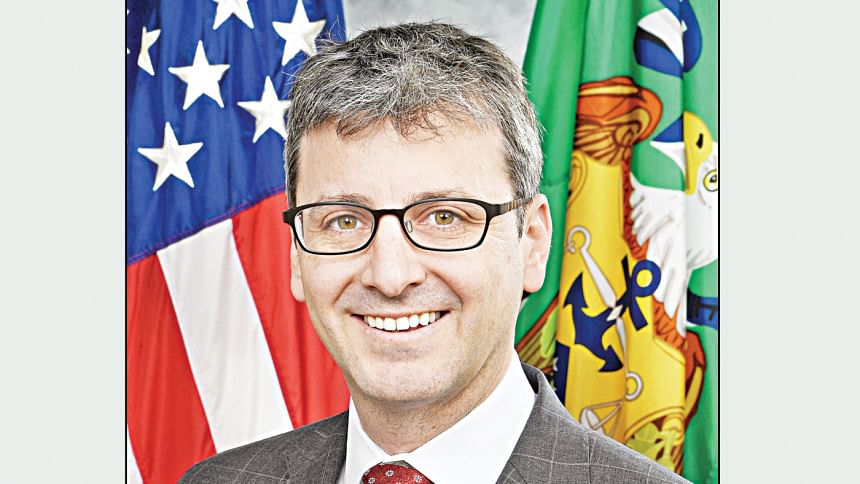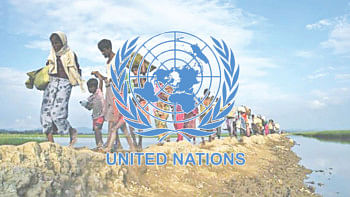US team in Dhaka: Trade, labour reforms to top agenda

Bangladesh is set to receive $200 million in technical assistance to support its institutional and economic reform initiatives as a high-profile US delegation, including Assistant Secretary Donald Lu, lands in Dhaka.
In its first such visit to Dhaka since the formation of the interim government, the US delegation will discuss ways of boosting trade and economy through necessary reforms in the financial and labour sectors.
Economic Relations Division Additional Secretary AKM Shahabuddin and USAID Mission Director Reed J Aeschliman will sign an agreement on the $200 million today, finance ministry sources said.
The delegation led by Brent Neiman, assistant secretary for International Finance at the US Department of the Treasury, arrived yesterday.
Other members include, Donald Lu, US assistant secretary of state for the Bureau of South and Central Asian Affairs; Änjali Kaur, deputy assistant administrator of USAID for the Bureau for Asia; Brandon Lynch, assistant US trade representative.
The delegation will also seek to know the roadmap for the next election. The current interim government is in charge of the country under unique circumstances. Under such contexts, the US delegation will seek a clear roadmap and restoration of democratic process, diplomatic sources said.
The delegation will also seek reforms in labour, financial management, and foreign investment sectors.
On the other hand, Bangladesh will want both technical and financial support from Washington as the country has undergone massive reforms and is facing financial challenges, they said.
The delegation will call on Chief Adviser Prof Muhammad Yunus, Foreign Adviser Touhid Hossain, Finance Adviser Saleh Uddin Ahmed, and Bangladesh Bank Governor Ahsan H Mansur and hold an official meeting with Foreign Secretary Jashim Uddin over lunch.
Officials from the ministries of foreign affairs, finance, commerce, labour, and Bangladesh Bank are also scheduled to be present.
"I think this will be more of an exploratory meeting. The US will want to know the present challenges Bangladesh faces and seek reforms. Moreover, they will want restoration of democracy," said M Humayun Kabir, former Bangladesh ambassador to the US.
He said Dhaka needs to explain the context of how the interim government is in power and the mammoth tasks of reforming state institutions and the economy.
There are serious challenges in financial management, foreign currency reserves, declining exports, etc. If there is not enough foreign currency to import fuel, the power sector will face troubles. Also, in the aftermath of the July protests, foreign orders for garments have declined, and there is unrest in the industries.
"Washington has the capacity to support us in various ways. For example, it can provide special privileges for boosting our garment exports to the US market," Humayun Kabir, also president of the Bangladesh Enterprise Institute, told this correspondent yesterday.
The US is Bangladesh's largest foreign direct investor (FDI) and largest export country destination. In 2022-23, US FDI in Bangladesh was $261 million. Last year, Bangladesh's export to the US was $7.72 and imports were worth $2.04 billion.
The US suspended GSP facilities following the Rana Plaza tragedy in 2013. In 2021, it imposed sanctions against Rab and seven of its officials, and last year it announced a visa policy for those undermining democratic elections in Bangladesh.
After the January election, Washington had said it was not free, fair, and participatory. However, it continued to have partnerships with Dhaka for economic prosperity and promoting the values of the Indo-Pacific Strategy (IPS), which many experts view as meant to counter China.
Humayun Kabir said Washington should be happy that the interim government now has taken up a massive reform initiative, which will help improve democratic values and good governance that go very much in line with the US IPS.
Besides, Washington can also support Bangladesh's need for funding from the IMF, World Bank, and ADB, he said.
"If Dhaka can convince Washington its current political and financial realities and the sincerity in reforms, including improving human rights situation, I think Washington can come up with necessary support – both financial and technical," he added.

 For all latest news, follow The Daily Star's Google News channel.
For all latest news, follow The Daily Star's Google News channel. 



Comments